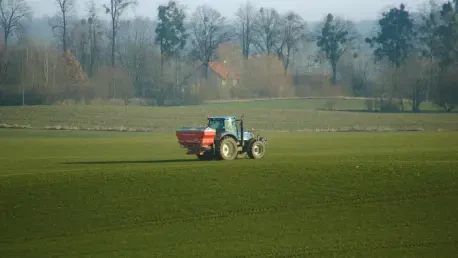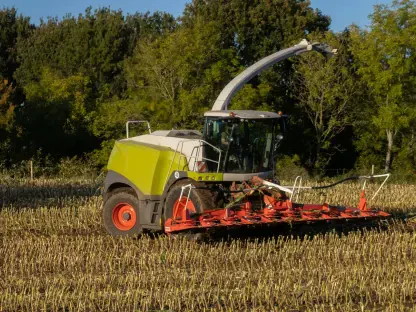Arkansas’s agricultural sector is standing on the precipice of an unprecedented disaster, grappling with staggering financial losses that threaten the very foundation of rural life in the state, as recent reports reveal a projected $1.4 billion in losses for the current season. This significant jump from earlier estimates paints a dire picture for farmers and the broader economy. This crisis, fueled by plummeting commodity prices, logistical nightmares, and global trade imbalances, extends far beyond the fields, impacting ancillary businesses and rural communities at large. The urgency for intervention has never been greater, as the potential closure of numerous farms looms on the horizon, signaling a possible economic catastrophe. With industry leaders sounding the alarm and advocating for federal support, the situation demands immediate attention to avert widespread fallout and preserve the livelihoods of countless Arkansans dependent on agriculture.
Economic Devastation Hits Rural Heartland
The core of Arkansas’s agricultural turmoil lies in the severe financial strain bearing down on farmers, with commodity prices, particularly for rice, sinking to an eight-year low. Agriculture Council of Arkansas President Joe Mencer has issued a stark warning that one in three farms could be forced to shut down by next spring if federal assistance does not materialize swiftly. This economic hardship is a heavy burden, with losses for the season now estimated at a staggering $1.4 billion, up from an earlier projection of $1.145 billion. The impact is palpable, as farmers struggle to cover operational costs and maintain their operations under the weight of these unprecedented deficits. Without immediate relief, the viability of many family-run farms hangs in the balance, threatening a way of life that has defined rural Arkansas for generations.
Beyond the farms, the economic fallout ripples through a wide array of connected industries, creating a domino effect of distress. Businesses such as agricultural equipment dealers, parts suppliers, and crop dusting services are reporting sales declines of up to 50%, a direct consequence of farmers cutting back on expenditures. Rural banks, which play a critical role in financing agricultural activities, face their own peril, with reports suggesting that as many as 25% of farmers may be unable to secure loans for the upcoming year. This financial instability risks triggering bank closures, further destabilizing the rural economy. The interconnected nature of these challenges highlights the urgent need for a comprehensive strategy to address not just the immediate losses but also the broader economic ecosystem that sustains Arkansas’s agricultural communities.
Global Competition Intensifies Struggles
Arkansas farmers are finding themselves outmatched on the global stage, facing intense competition from countries like Brazil, where production costs are significantly lower. Supported by substantial Chinese investments in infrastructure such as railroads and ports, Brazilian farmers benefit from reduced operational expenses, minimal regulatory oversight, and lower labor costs. This allows them to produce commodities like soybeans at prices that American farmers cannot match, creating a glaring competitive disadvantage. The global market dynamics are further skewed as approximately 70% of Brazil’s agricultural output is exported to China, cementing an economic relationship that disadvantages U.S. producers struggling to maintain market share.
The influence of international trade extends beyond mere pricing, as it shapes the supply chains and equipment choices of competing nations. Brazilian farmers, incentivized by their trade ties with China, often purchase Chinese-made equipment and products, further reducing their costs. This trend exacerbates the challenges for Arkansas farmers, who face higher technology fees and stricter regulations at home. Executive Director Andrew Grobmyer of the Agriculture Council of Arkansas has pointed out how these global imbalances place American agriculture in a precarious position, unable to compete effectively. The mounting pressure from international markets underscores the need for strategic policy interventions to level the playing field and protect domestic agricultural interests from being undermined by foreign competition.
Logistical Nightmares with Storage Shortages
Compounding the financial and competitive challenges, Arkansas farmers are grappling with a severe storage crisis that threatens to worsen their predicament. Last year’s dismal commodity prices prompted many to store grain rather than sell at a loss, resulting in facilities that are now at full capacity as the new harvest season approaches. Joe Mencer has described the unthinkable scenario of piling grain on the ground due to the lack of storage space, a situation he notes as unprecedented in his extensive experience. This logistical hurdle not only hampers the management of existing inventory but also poses significant risks to the quality and marketability of crops, adding another layer of economic strain to an already burdened industry.
The storage shortage is more than a temporary inconvenience; it represents a critical failure in the agricultural supply chain with far-reaching consequences. With no room to house incoming harvests, farmers face the prospect of significant losses from spoilage or forced sales at rock-bottom prices. This crisis amplifies the financial distress already felt across the sector, as the inability to store crops effectively limits options for weathering market fluctuations. The situation serves as a stark reminder of the multifaceted challenges facing Arkansas agriculture, where even basic operational needs are becoming insurmountable obstacles. Addressing this issue requires immediate attention to infrastructure and innovative solutions to ensure farmers can manage their harvests without resorting to desperate measures.
Federal Support Becomes Critical Lifeline
In response to the escalating crisis, the Agriculture Council of Arkansas has intensified its efforts to secure federal intervention, recognizing that time is of the essence. Direct appeals have been made to the White House and the U.S. Trade Representative, urging the redirection of a portion of the record $100 billion in tariff collections to provide financial relief to struggling farmers. Additional proposals include incentives for renewable fuels markets and support for legislative initiatives such as the Buy American Cotton Act and the Grown in America Act. While some federal measures, like the Emergency Commodity Assistance Program, have been enacted, their limited scope and delayed benefits—some not taking effect until 2026—offer little immediate solace to farmers on the brink of collapse.
The urgency for federal action is echoed by industry leaders who stress that the current trajectory is unsustainable without substantial support. Existing relief efforts, though a step in the right direction, fall short of addressing the scale of the crisis, leaving many farmers at risk of losing everything before help arrives. The Agriculture Council’s advocacy underscores the need for swift, decisive measures to bridge the gap between current struggles and long-term solutions. Beyond financial aid, there is a call for policy reforms that can bolster domestic agriculture against global pressures. The situation demands a coordinated response that prioritizes the immediate needs of Arkansas farmers while laying the groundwork for a more resilient agricultural future.
Economic Fallout Across Rural Communities
The agricultural crisis in Arkansas is not confined to individual farms; its repercussions are felt deeply across the rural economy, threatening the stability of entire communities. Ancillary businesses that depend on agricultural activity, from equipment suppliers to service providers, are experiencing sharp declines in revenue, with some sectors reporting drops as severe as 50%. This downturn erodes the economic foundation of small towns, where agriculture often serves as the primary driver of commerce and employment. The cascading effects are evident, as reduced spending by farmers translates into fewer jobs and diminished prospects for local businesses already struggling to stay afloat in challenging times.
Equally alarming is the looming threat to rural banking systems, which are integral to the financial health of agricultural communities. With a significant portion of farmers unable to secure financing for the next season, the risk of bank closures looms large, potentially disrupting access to credit for countless others. Industry voices, including Mencer and Grobmyer, have described the situation as a disaster in the making, with the potential to unravel the social and economic fabric of rural Arkansas. The interconnected challenges highlight the urgent need for a holistic approach to mitigate the broader impacts, ensuring that support measures extend beyond farms to safeguard the vitality of the communities they sustain.
Advocacy and Political Push for Solutions
At the state level, Governor Sarah Sanders has taken steps to engage with the agricultural sector through roundtables, signaling a commitment to understanding and addressing the crisis. These discussions provide a platform for farmers and industry leaders to voice their concerns and push for actionable solutions. Meanwhile, the Agriculture Council of Arkansas is leveraging the state’s political influence, working closely with congressional delegates who hold key committee roles to advocate for federal relief. Personal meetings and persistent lobbying efforts reflect a determination to secure the resources and policies needed to navigate this turbulent period, though the scale of the challenge remains daunting.
The push for federal and state collaboration is seen as a critical component of any viable solution, with advocacy focusing on both immediate aid and long-term reforms. Efforts to redirect tariff revenues and support legislative acts aim to provide a financial cushion while addressing systemic issues like global trade disparities. The proactive stance of Arkansas’s agricultural leaders offers a glimmer of hope, yet the ticking clock adds pressure to achieve results before irreversible damage occurs. As the crisis unfolds, the combined efforts of state officials and industry advocates must translate into concrete action to protect the future of agriculture in the state, ensuring that rural communities are not left to bear the brunt of this disaster alone.









